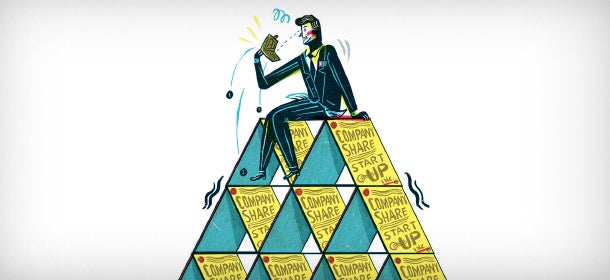
Image credit: Illustration © Jakob Hinrichs
One of the strangest things about being a startup founder
is that I'm running a multimillion-dollar company but earning a salary
far below my market value. My company may be worth a lot, but the vast
majority of my personal net worth is tied up in an illiquid asset
(company stock), which is no help to me as a mom with two small kids, a
mortgage, medical bills and day-to-day expenses.
Five years in and easily $500,000 below what should have been my accumulated earnings since 2009, I'm left scratching my head. I hear murmurings that some founders sell personal shares long before an exit. Should I do the same? Should you if you're in this boat?
A quick survey of other startup founders revealed that they believe it's OK to sell a tiny percentage of stock (in the single digits) once a company's valuation reaches $10 million.
What you want to avoid is the obvious cash grab. People grimaced when Foursquare founders Dennis Crowley and Naveen Selvadurai took home $4.6 million--23 percent--of their $20 million Series B funding in 2010.
Most of the founders I spoke with agree that you should try to sell to inside investors first. "It gives you a cleaner cap table, and you can tell a better story around it; i.e., the insiders wanted to help you stay focused on the long term," says Jon Crawford of e-commerce platform Storenvy. He points out that if the people closest to you are pushing for a bigger slice of your stock holdings, it's a testament to just how valuable they think your company is.
Karl Jacob, startup founder and angel investor since the 1990s, has witnessed CEOs sleeping in their cars because they can't make their rent. "That's not good for anyone, including the investors, who need a CEO working long hours in top mental and physical form," he says. To ensure that you don't end up in this scenario, Jacob advises startup founders to pay close attention to their stockholder agreements upfront to make sure they can sell a small percentage without restriction.
I'm not sure if I'll take the plunge and sell some of my stock to ease my cash crunch, but it's nice to know that it's not necessarily viewed as a bad move.
Five years in and easily $500,000 below what should have been my accumulated earnings since 2009, I'm left scratching my head. I hear murmurings that some founders sell personal shares long before an exit. Should I do the same? Should you if you're in this boat?
A quick survey of other startup founders revealed that they believe it's OK to sell a tiny percentage of stock (in the single digits) once a company's valuation reaches $10 million.
What you want to avoid is the obvious cash grab. People grimaced when Foursquare founders Dennis Crowley and Naveen Selvadurai took home $4.6 million--23 percent--of their $20 million Series B funding in 2010.
Most of the founders I spoke with agree that you should try to sell to inside investors first. "It gives you a cleaner cap table, and you can tell a better story around it; i.e., the insiders wanted to help you stay focused on the long term," says Jon Crawford of e-commerce platform Storenvy. He points out that if the people closest to you are pushing for a bigger slice of your stock holdings, it's a testament to just how valuable they think your company is.
Karl Jacob, startup founder and angel investor since the 1990s, has witnessed CEOs sleeping in their cars because they can't make their rent. "That's not good for anyone, including the investors, who need a CEO working long hours in top mental and physical form," he says. To ensure that you don't end up in this scenario, Jacob advises startup founders to pay close attention to their stockholder agreements upfront to make sure they can sell a small percentage without restriction.
I'm not sure if I'll take the plunge and sell some of my stock to ease my cash crunch, but it's nice to know that it's not necessarily viewed as a bad move.

No comments:
Post a Comment